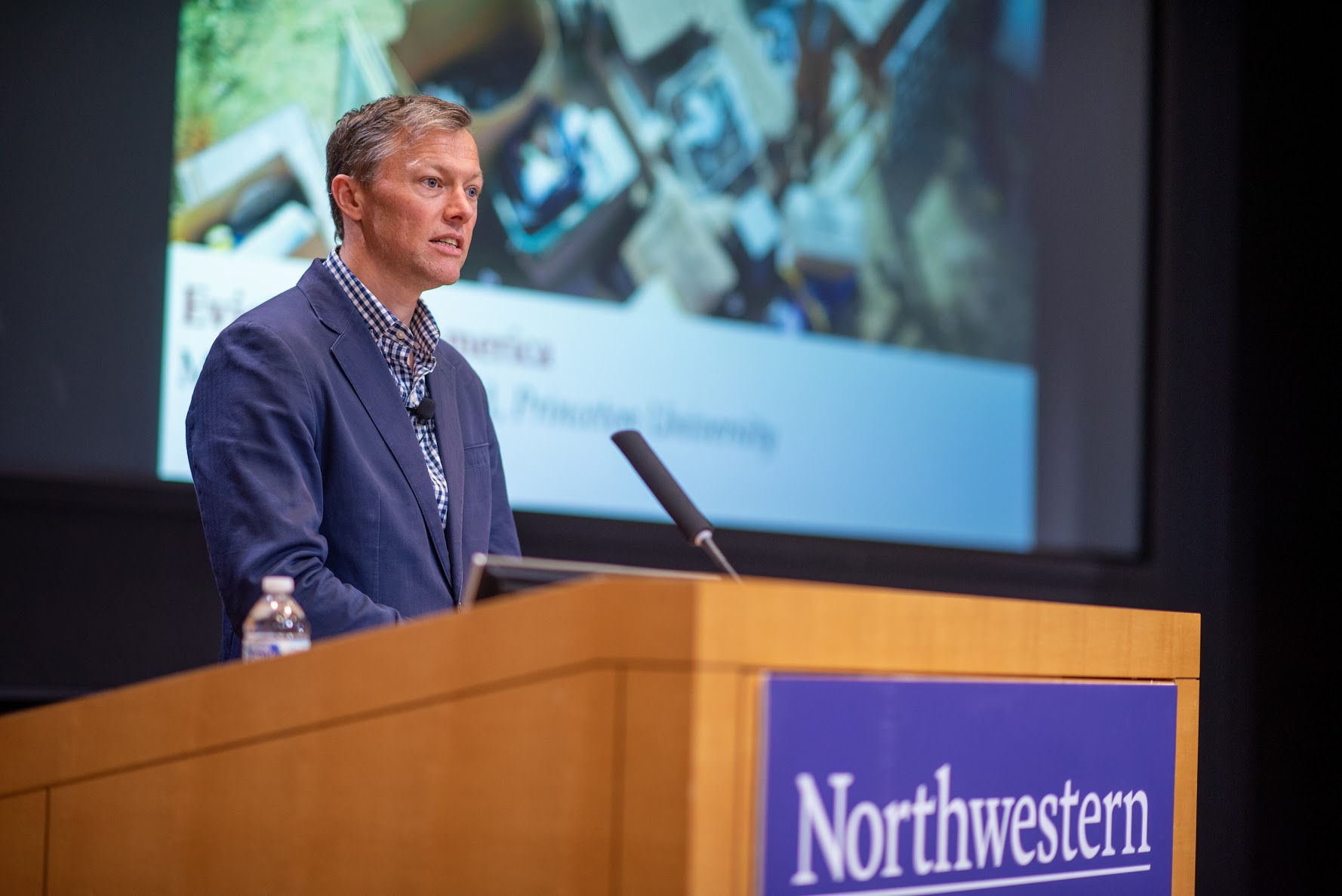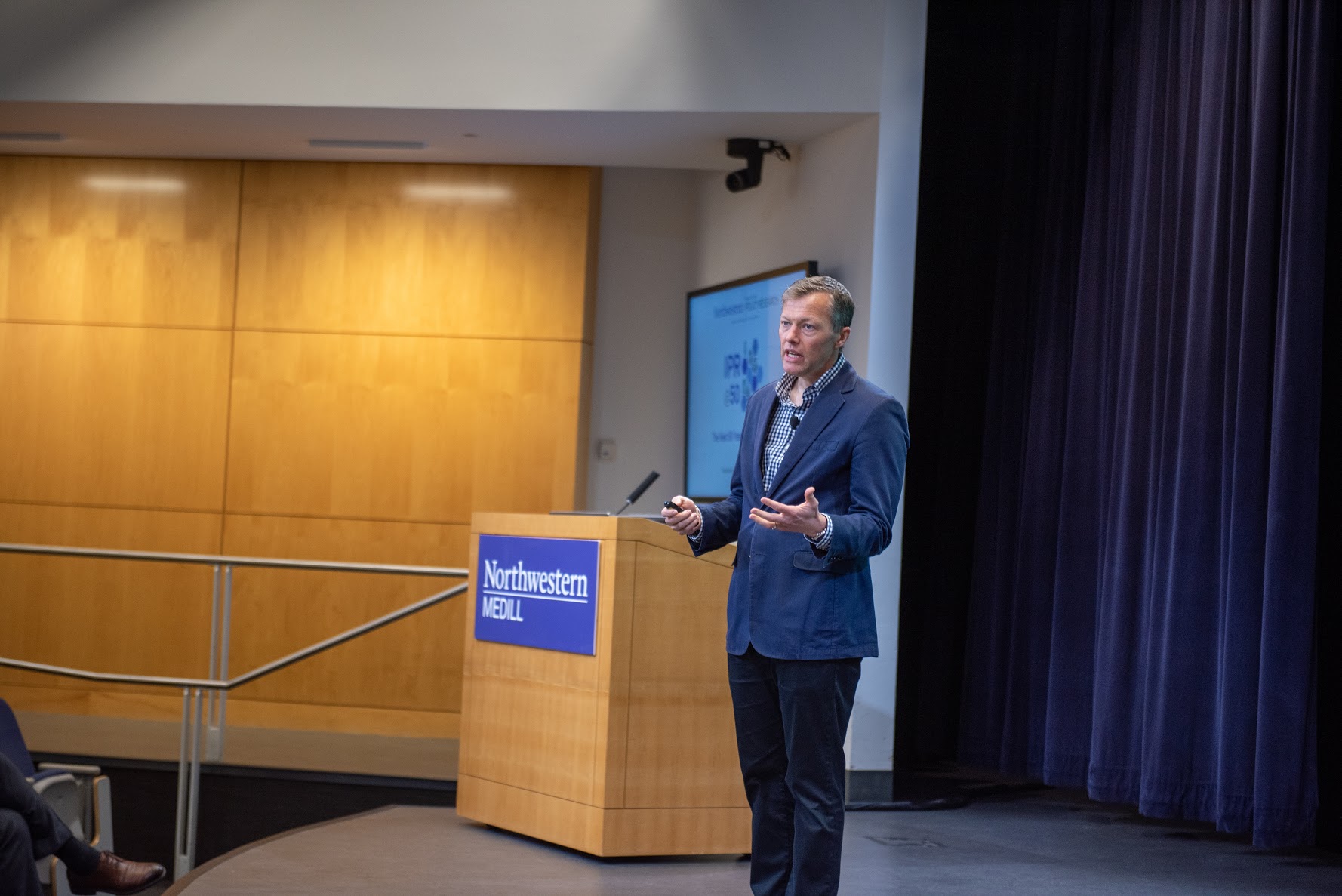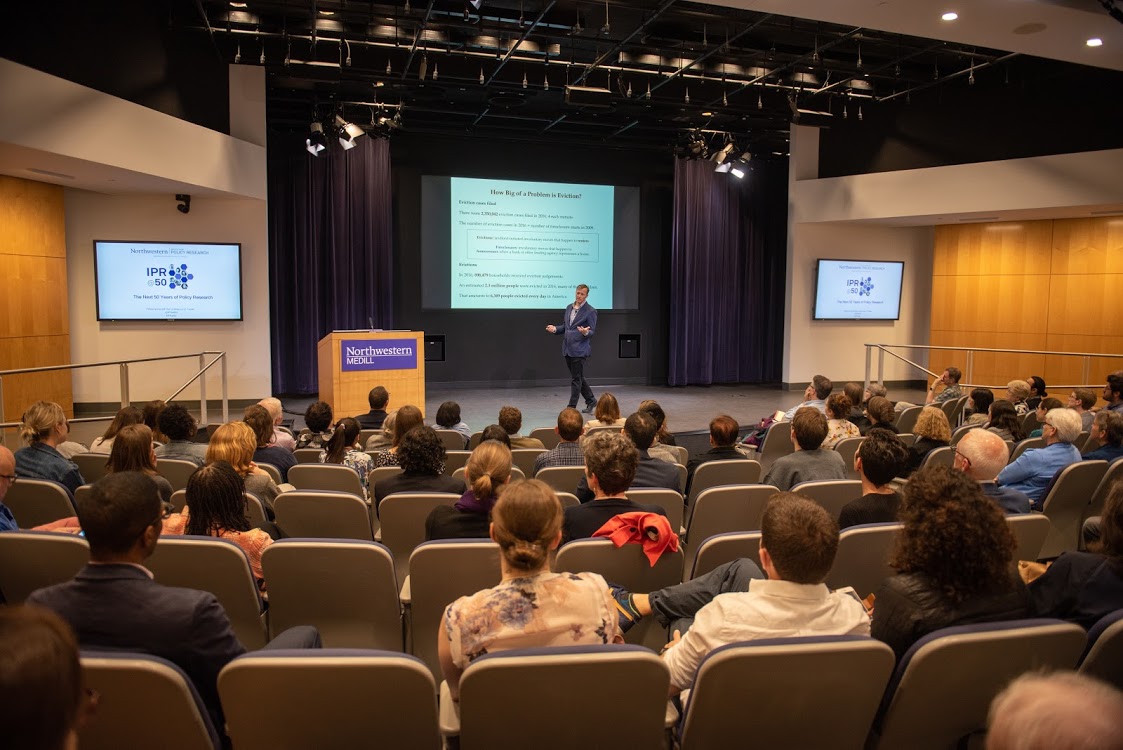Distinguished Lecture: Evictions in America
Matthew Desmond challenges researchers to publicize data and rethink poverty research
Get all our news
We might need another relational way of understanding inequality in America,” Desmond suggested. “The fact that there are winners and losers, and there are often losers because there are winners.”
Matthew Desmond
Maurice P. During Professor of Sociology at Princeton University and founding director of the Eviction Lab

Matthew Desmond described how soaring housing costs and stagnant incomes are linked to a rise in U.S. evictions.
Many Americans believe that the 2007 subprime mortgage crisis was the last major U.S. housing crisis. But we are still living through a housing crisis when you consider the estimated 2 million Americans evicted from their homes each year, Princeton University sociologist Matthew Desmond said during the Institute for Policy Research’s 50th Anniversary (IPR@50) keynote lecture on June 6 at Northwestern University.
Desmond, who began researching evictions in Milwaukee in 2008, described how 20 years of stagnant incomes for the poorest Americans and soaring housing costs are linked with a rise in U.S. evictions.
“That means we've moved from a place where evictions used to be scandalous and rare, to a place where a lot of families in America are really living very close to the threat of losing their home,” he said.
In introducing Desmond, a MacArthur “genius,” Pulitzer Prize winner, and award-winning researcher, IPR Director told the audience of more than 120 that “Matthew Desmond is an especially appropriate speaker for our IPR@50 celebration because of his leading-edge research into complex social issues of poverty, race, and more, as well as his great ability to disseminate his work.”
Publicizing Data to Accelerate Local Responses
After publishing his Milwaukee findings in Evicted: Poverty and Profit in the American City (Crown Publishing Group, 2016), Desmond realized the federal government was not keeping track of evictions. So he started the Eviction Lab, the first national database of evictions, which has since collected nearly 83 million eviction records going back to 2000.

The lab calculated that 2.3 million eviction cases were filed across the country in 2016. The records revealed that in some areas of the United States, a typical eviction judgment is issued for two months’ missed rent or less, and in a study of 8 million of the lab’s records, half of all eviction filings were serial evictions—repeated eviction filings against the same tenant. The data also shifted the narrative that evictions only happen in expensive cities like New York and San Francisco; low-cost cities also can have high eviction rates, like Richmond, Virginia, which has one of the nation’s highest eviction rates.
As Desmond discussed the data, he encouraged researchers to consider sharing their research with the local community before submitting academic papers.
“The speed at which our problems are running and the speed of academia are often on very different tracks,” Desmond explained. “[So] how can we speed up what we know?”
Giving local data to communities allows for a quicker local response, he said.
He explained how one article on Richmond’s eviction rates based on his lab’s data in the New York Times led to 66 more by the local media in 2018. The state government responded by increasing the budget for affordable housing and passing anti-eviction legislation.
“When you release information and get out of the way, you let local storytellers own their own story,” Desmond said.
Using Data for Policy Decisions
Desmond also outlined how data could illuminate simple policy ideas in courts and other areas to lower evictions.
“Eviction court should be the court of last resort, not the court of first resort,” Desmond said, arguing that eviction court should not be used to collect rent.

To decrease eviction rates, he noted how the data revealed that simple institutional changes such as raising filing fees, just to $200, sets a higher bar for evictions—and even changing rent due dates from the beginning of the month to later to match when a minimum-wage paycheck arrives could help.
One policy opportunity Desmond highlighted challenged the idea that landlords in poorer neighborhoods are struggling—and how it could open up opportunities for homeownership.
“If you’re a landlord in a poor neighborhood, you’re not just making a little bit more," Desmond said. "Nationwide, by our calculations, you’re making double what a landlord makes in an affluent neighborhood."
These high rents, possibly charged due to risks associated with older buildings and more evictions, often mean the gap between rent in low-income neighborhoods and more affluent ones is very small. This becomes problematic for both landlords and their low-income renters.
“If you price up your housing to hedge for risk, you may be overburdening your consumer base by asking them to pay more than they can, increasing your risk,” Desmond said.
He proposed that policymakers ask landlords to show exactly how much they collect from their low-income rental properties and that they reconsider homeownership opportunities in poorer neighborhoods.
Thinking of Poverty as ‘Robbery’
Playing off of the theme of IPR@50 and the future of social policy research, Desmond challenged the audience to think about new theories around poverty in America as they look toward the next 50 years.

“We might need another relational way of understanding inequality in America,” Desmond suggested. “The fact that there are winners and losers, and there are often losers because there are winners.”
This might mean looking at more complex data that considers different actors in the housing industry, such as landlords and real estate investors, not just the people evicted from their homes. Desmond also argues that it means bringing the eviction debate and poverty debate together, while considering the people who are responsible for the housing crisis.
“We always talk about poverty as a result of a lack,” Desmond said, quoting from Family Properties, historian Beryl Satter’s book on housing discrimination in Chicago. “What if we thought of it as a kind of robbery? Can we think of talking about poverty in the language of justice and moral reckoning?”
Matthew Desmond is the Maurice P. During Professor of Sociology at Princeton University and founding director of the Eviction Lab. This Distinguished Public Policy Lecture was part of IPR@50: The Next 50 Years of Policy Research.
Photo credits: Rob Hart.
Published: June 26, 2019. Updated: July 16, 2019.


